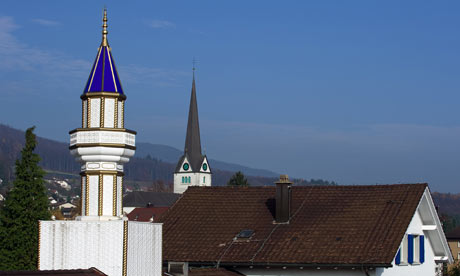Swiss vote to ban construction of minarets on mosques
Vote represents blow to Switzerland's political establishment

One of only four minarets in Switzerland, on a Muslim centre in Wangen bei Olten, contrasts with a church tower. Photograph: Fabrice Coffrini/AFP
Switzerland became the first country in Europe todayto vote to curb the religious practices of Muslims when a referendum banning the construction of minarets on mosques was backed by a solid majority.
The surprise result, banning minarets in a country that has only four mosques with minarets and no major problems with Islamist militancy, stunned the Swiss establishment, which was bracing itself for a backlash in the Middle East.
The result looks likely to cause strife where there was relative peace, sully the country's image abroad, damage investment and trade with the Muslim world, and set back efforts to integrate a population of some 400,000 Muslims, most of whom are European Muslims – and non-mosque-goers – from the Balkans.
The campaign to ban minarets was described by the country's justice minister as a "proxy war" for drumming up conflict between ethnic Swiss and Muslim immigrants. But the ban was supported by a majority of 57.5%, 20 percentage points more than predicted in opinion polls in the run-up to the vote.
"The federal council [the body that constitutes the federal government] respects this decision," said a government statement tonight . "The construction of new minarets in Switzerland is no longer permitted."
While surprising, the verdict raised the question of whether such curbs on Muslims would be replicated across Europe were voters given their say. If Switzerland is the only country in Europe to embark on such a ban, that may be because its system of plebiscitary democracy compels single-issue referendums if petitions amass enough signatures.
Across Europe, far-right parties have been scoring gains in recent years on anti-Muslim and anti-immigrant platforms.
The result represented a triumph for the far-right populist Swiss People's party, which organised the petition paving the way for the referendum. In opposition, the SPP became the strongest party in Switzerland two years ago largely by running a robust campaign, denounced as racist by the UN, against immigrants.
The result also represented an act of mass defiance of the national establishment. The government, mainstream political parties, the churches, the main newspapers, the national president, the powerful business lobby, and the Vatican all opposed the ban, but it was backed by 22 of the country's 26 cantons on a national turnout of more than 53% .
As a result, the article of the national constitution regulating relations between the state and religion will be amended to include the bald statement: "The construction of minarets is forbidden."
"The result is unworthy of Switzerland's tradition and history," said Farhad Afshar, a leading Swiss Muslim and Berne University sociologist. "Muslims are well-integrated here compared with France or Germany. This result has nothing to do with the Muslims living in Switzerland."
The SPP said the minaret ban would "be implemented to the letter" and denounced senior church figures for the "alarming role" they played in the campaign.
Opponents of the move in the government, churches and human rights organisations had argued a ban on minarets would infringe fundamental liberties and freedom of religion. Green Party leaders warned tonightthat the ban could be unconstitutional and threatened to try to overturn the verdict at the European court of human rights in Strasbourg.
Ulrich Schlüer, an SPP MP who led the ban campaign, pointed out that the Strasbourg court had recently ruled against crucifixes in classrooms in Italy.
"It now appears that Christian towns are not supposed to use Christian symbols," he said. "But we're supposed to have Muslim symbols." The SPP said that going to the European court would breach the popular sovereignty that underpins the Swiss democratic model and tradition.
It dismissed the arguments about freedom or religion, asserting that minarets were not a religious but a political symbol, and the thin end of a wedge that would bring sharia law to the country, with forced marriages, "honour" killings, female genital mutilation and oppression of women.
A handful of recent applications for building permits for minarets in Switzerland, the no campaigners said, was proof to many Swiss "of the next step in the strategy of Islamification of our country. The fear is great that the minarets will be followed by the calls to prayer of the muezzin … sharia is gaining in importance in Switzerland and in Europe. That means honour killings, forced marriages, circumcision, wearing the burka, ignoring school rules, and even stoning."
The prohibition also found substantial support on the left and among secularists worried about the status of women in Islamic cultures. Prominent feminists attacked minarets as male power symbols, deplored the oppression of Muslim women, and urged a vote for the ban.
The justice minister, Eveline Widmer-Schlumpf, a strong opponent of the ban, said the result reflected fears about Islamic fundamentalist tendencies. "The Federal Council [government] takes the view that a ban on the construction of new minarets is not a feasible means of countering extremist tendencies."
She had previously criticised the prohibition campaign as a violation of human rights and as a "proxy war" for those seeking to stir up religious friction.
Corine Mauch, the mayor of Zurich, who also opposed the ban, said the vote was "a fateful signal to the Muslim community".
Swiss business is worried that the anti-Muslim vote could have a serious impact on trade with the Arab world. More immediately, there is concern for two Swiss businessmen abducted in Libya last year after Colonel Muammar Gaddafi's son and daughter-in-law were arrested in a Geneva hotel on suspicion of mistreating their staff. The two Swiss, regarded as hostages, were handed over to the Swiss embassy in Tripoli earlier this month but have still been denied exit visas and could yet face trial

Aucun commentaire:
Enregistrer un commentaire